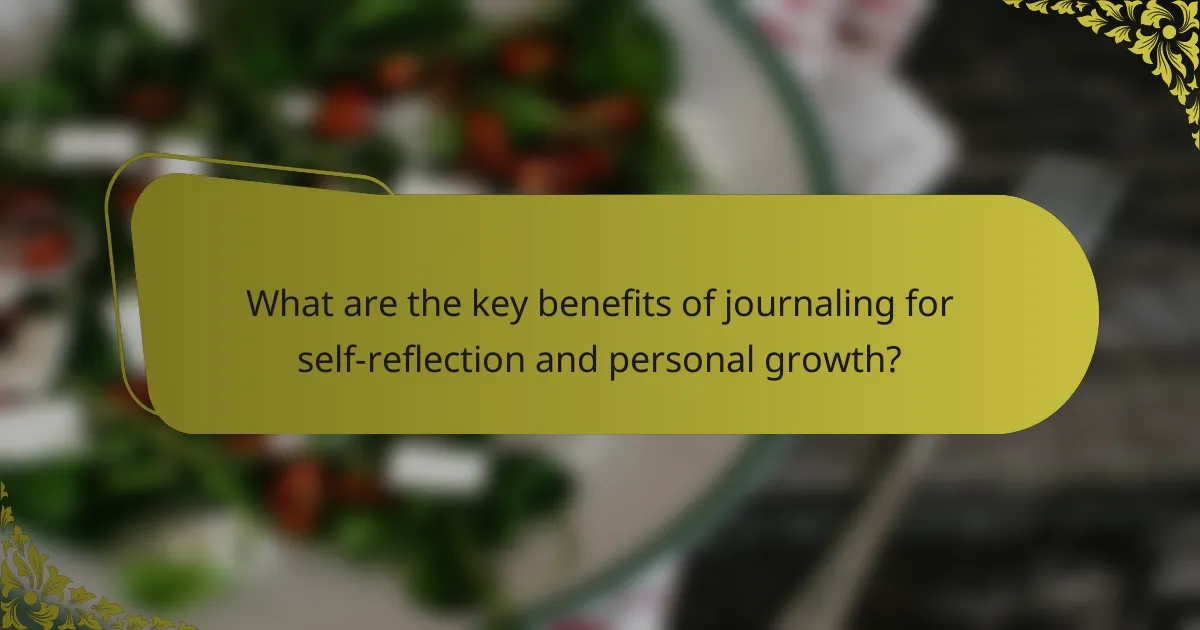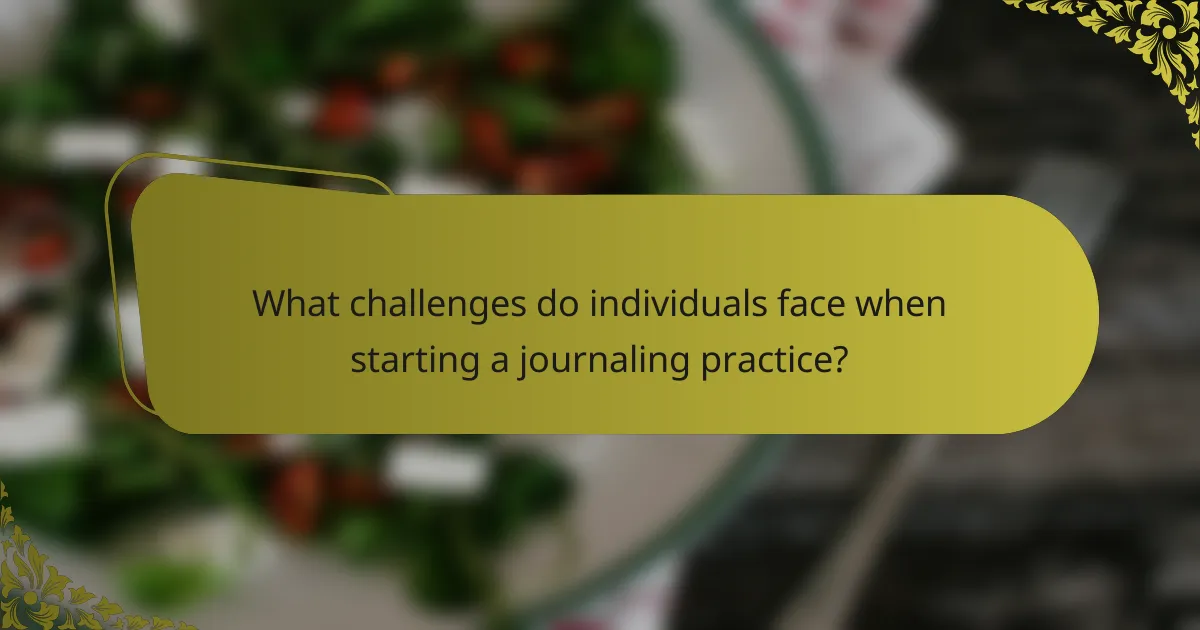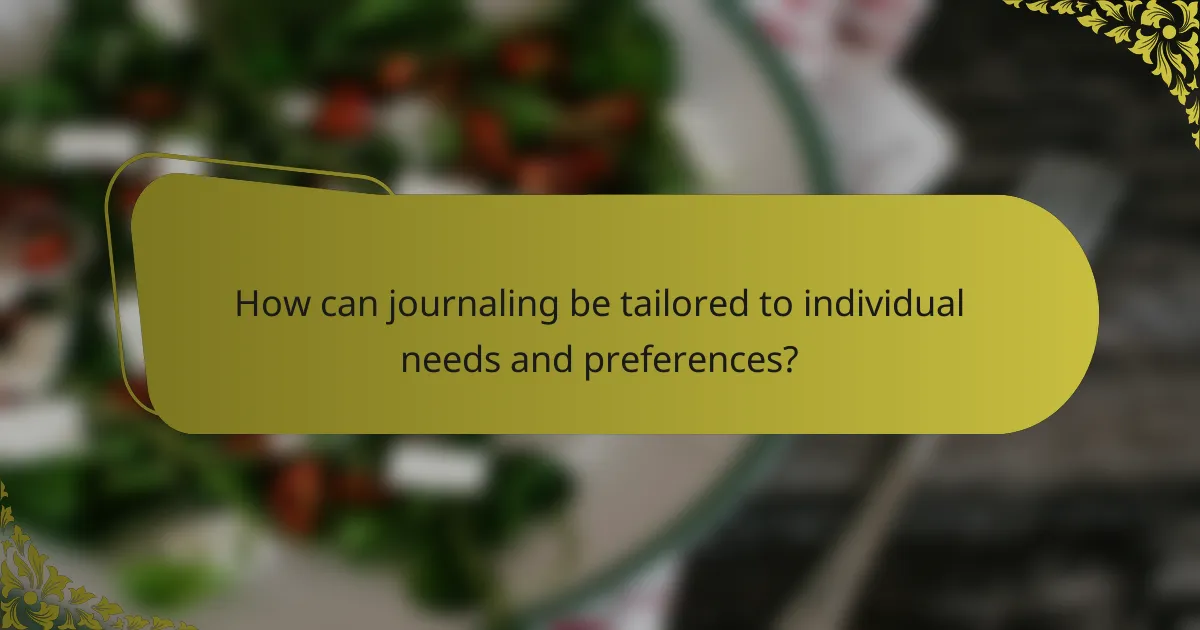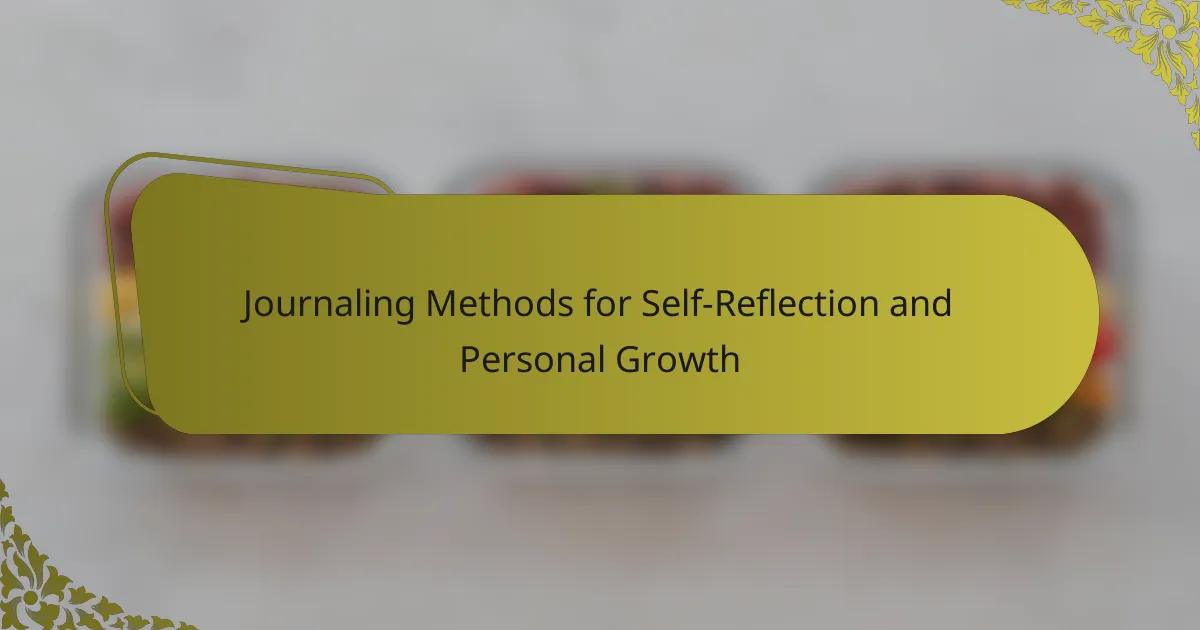Journaling methods can significantly enhance self-reflection and personal growth by promoting clarity and emotional processing. Popular techniques include bullet journaling for organization, gratitude journaling for positivity, and reflective journaling for deep self-exploration. Various tools like digital apps and guided journals cater to individual preferences, making journaling a versatile practice. Overcoming common challenges can lead to long-term benefits such as improved self-awareness and emotional regulation.

What are the key benefits of journaling for self-reflection and personal growth?
Journaling enhances self-reflection and personal growth by promoting clarity, emotional processing, and goal setting. It allows individuals to articulate thoughts, track progress, and cultivate mindfulness. Regular journaling can lead to increased self-awareness, improved problem-solving skills, and heightened emotional intelligence. As a result, practitioners often experience greater resilience and a deeper understanding of their values and aspirations.
How does journaling enhance emotional intelligence?
Journaling enhances emotional intelligence by promoting self-awareness and emotional regulation. It allows individuals to process feelings, recognize patterns, and develop empathy. Regular reflection through writing deepens understanding of personal experiences and improves interpersonal relationships. Studies show that expressive writing can lead to better emotional clarity, helping individuals articulate their emotions more effectively.
Why is journaling effective for stress management?
Journaling is effective for stress management as it promotes emotional expression and cognitive clarity. Writing down thoughts helps individuals process feelings, reducing anxiety and enhancing self-awareness. Studies show that expressive writing can lower stress levels and improve overall mental health. Regular journaling fosters a routine that encourages reflection, making it a powerful tool for personal growth.
Which specific personal growth areas can journaling impact?
Journaling can significantly impact various personal growth areas, including emotional clarity, self-awareness, goal setting, stress reduction, creativity, and problem-solving. These outcomes stem from the reflective nature of journaling, which encourages individuals to explore thoughts and feelings deeply.
Emotional clarity arises as journaling helps individuals articulate emotions, leading to better emotional regulation. Self-awareness improves through regular reflection on experiences and behaviors, fostering personal insights. Goal setting becomes more structured as journaling allows for tracking progress and refining aspirations.
Stress reduction is a common benefit, as writing about challenges can provide relief and perspective. Creativity flourishes in a journal, offering a safe space for free expression and idea generation. Lastly, problem-solving skills enhance as journaling encourages critical thinking and exploration of solutions.
Overall, journaling serves as a versatile tool for personal development across multiple dimensions.

What are the most popular journaling methods for personal development?
The most popular journaling methods for personal development include bullet journaling, gratitude journaling, and reflective journaling. Each method offers unique benefits that enhance self-reflection and growth.
Bullet journaling combines organization with creativity, allowing users to track goals, habits, and thoughts in a customizable format. Gratitude journaling focuses on cultivating positivity by recording daily things for which one is thankful, fostering a mindset shift. Reflective journaling encourages deep self-exploration, prompting users to analyze experiences, emotions, and decisions for improved self-awareness.
These methods cater to different preferences and objectives, making journaling a versatile tool for personal development.
How does bullet journaling differ from traditional journaling?
Bullet journaling emphasizes organization and flexibility, while traditional journaling focuses on freeform expression. Bullet journaling uses symbols and layouts for tracking tasks, events, and reflections, enhancing productivity and mindfulness. In contrast, traditional journaling allows for more narrative and emotional exploration without structured formats. The unique attribute of bullet journaling is its customizable system, which adapts to individual needs for planning and reflection. Traditional journaling, however, often serves as a rare outlet for creativity and personal storytelling.
What is the significance of gratitude journaling?
Gratitude journaling significantly enhances self-reflection and personal growth. It fosters a positive mindset by encouraging individuals to focus on their blessings, leading to increased happiness and reduced stress. Regular practice can improve emotional well-being, promote resilience, and strengthen relationships. Studies show that people who engage in gratitude journaling report higher life satisfaction and lower rates of depression. This method serves as a powerful tool for cultivating mindfulness and self-awareness.
How can expressive writing facilitate self-discovery?
Expressive writing facilitates self-discovery by allowing individuals to explore thoughts and emotions deeply. This method enhances self-awareness and clarity, fostering personal growth. By articulating feelings, writers can identify patterns and insights about their experiences. Regular journaling cultivates a habit of reflection, promoting emotional processing and resilience. Engaging with one’s inner dialogue through expressive writing can lead to transformative realizations and a stronger sense of identity.

Which tools and formats can enhance the journaling experience?
To enhance the journaling experience, various tools and formats can be utilized. These include digital journaling apps, bullet journals, guided journals, and art journals. Each format offers unique benefits that cater to different self-reflection styles and personal growth objectives.
Digital journaling apps provide convenience and accessibility, allowing users to write anytime, anywhere. Bullet journals offer a customizable structure that promotes organization and creativity. Guided journals come with prompts that encourage deeper introspection, while art journals combine visual expression with writing, fostering creativity and emotional release.
What are the advantages of digital versus paper journaling?
Digital journaling offers advantages over paper journaling, including accessibility, organization, and searchability. Digital formats allow for easy editing and multimedia integration, enhancing the self-reflection experience. Paper journaling provides a tactile experience that some find beneficial for creativity and mindfulness. Digital methods often include features like password protection and cloud storage, ensuring privacy and security. Ultimately, the choice depends on personal preferences and desired outcomes for self-growth.
How can journaling apps support self-reflection?
Journaling apps can significantly enhance self-reflection by providing structured prompts and tracking emotional patterns. They facilitate deeper insights into personal experiences and thoughts, promoting mindfulness and clarity.
These apps often feature customizable templates, allowing users to tailor their journaling experience. For instance, some provide mood tracking, which helps identify emotional triggers and patterns over time.
Additionally, many journaling apps incorporate features like reminders and goal-setting, encouraging consistent practice. This regular engagement fosters a habit of reflection, which is essential for personal growth.
Moreover, the privacy and accessibility of digital journaling make it easier for users to express themselves freely, enhancing the overall effectiveness of self-reflection.
Which prompts can stimulate deeper insights in journaling?
Open-ended prompts stimulate deeper insights in journaling. Consider these effective prompts to enhance self-reflection:
1. What emotions did I experience today, and why?
2. What lessons did I learn from my recent challenges?
3. How have my values evolved over the past year?
4. In what ways can I practice gratitude daily?
5. What fears are holding me back, and how can I confront them?
6. What does success look like for me, and how can I achieve it?

What challenges do individuals face when starting a journaling practice?
Individuals face several challenges when starting a journaling practice, including lack of motivation, fear of self-exposure, and uncertainty about what to write. Many struggle with consistency, finding it difficult to make journaling a daily habit. Additionally, some may feel overwhelmed by the pressure to write perfectly or fear judgment of their thoughts. These obstacles can hinder personal growth and self-reflection, making it essential to approach journaling with a flexible mindset.
How can one overcome writer’s block in journaling?
To overcome writer’s block in journaling, try various methods to spark creativity. Engaging in free writing can help bypass mental barriers, allowing thoughts to flow without self-censorship. Setting a timer for short bursts of writing encourages consistent practice. Additionally, prompts can provide direction; use questions or themes to guide entries. Establishing a routine can create a habit that reduces blockages over time. Finally, incorporating mindfulness techniques can enhance focus and reduce anxiety surrounding the writing process.
Why do some people struggle with consistency in journaling?
Some people struggle with consistency in journaling due to lack of time, motivation, or clarity on their goals. These factors can hinder the journaling process and lead to sporadic entries. Time constraints often arise from busy schedules, making it difficult to prioritize self-reflection. Motivation can fluctuate, particularly if individuals do not see immediate benefits. Additionally, unclear goals may result in uncertainty about what to write, leading to frustration. Establishing a routine, setting specific objectives, and recognizing the long-term benefits can enhance consistency in journaling.

How can journaling be tailored to individual needs and preferences?
Journaling can be tailored to individual needs by selecting methods that resonate personally. Consider these approaches:
1. **Prompt Journaling**: Use specific prompts to guide reflections, catering to emotional or situational needs.
2. **Gratitude Journaling**: Focus on daily gratitude entries to enhance positivity and mindfulness.
3. **Bullet Journaling**: Combine organization and creativity, allowing for personalized layouts and goal tracking.
4. **Art Journaling**: Integrate drawings or collages for those who express themselves better visually.
5. **Stream of Consciousness**: Write freely without structure to explore thoughts and feelings deeply.
These methods empower individuals to create a journaling practice that aligns with their preferences and goals.
What unique journaling techniques cater to different personality types?
Different journaling techniques cater to various personality types, enhancing self-reflection and personal growth. Introverts may prefer reflective journaling, focusing on personal thoughts and feelings, while extroverts might enjoy dialogue journaling, engaging with their thoughts as if in conversation.
Creative individuals often benefit from visual journaling, combining images and text to express emotions. Analytical types may gravitate towards structured journaling, using prompts and frameworks to organize thoughts. Mindfulness journaling suits those seeking present-moment awareness, incorporating gratitude and meditation practices.
Each technique aligns with distinct personality traits, allowing individuals to explore their inner worlds effectively.
How can cultural influences shape journaling practices?
Cultural influences significantly shape journaling practices by dictating themes, styles, and purposes. Different cultures emphasize various aspects of self-reflection, impacting how individuals document their thoughts and experiences.
For instance, in many Eastern cultures, journaling may focus on mindfulness and spiritual growth, often incorporating elements of meditation. In contrast, Western cultures may prioritize personal achievement and goal setting, leading to more structured journaling methods.
Additionally, cultural values influence the frequency and context of journaling. In collectivist societies, communal sharing of journal entries may occur, while individualistic cultures may encourage private reflection.
These cultural dimensions create diverse journaling practices that enhance personal growth and self-awareness across different societies.

What are the long-term impacts of a consistent journaling habit?
Consistent journaling fosters long-term benefits such as enhanced self-awareness, improved emotional regulation, and increased clarity of thought. Over time, individuals often report reduced stress levels and greater resilience in facing challenges. Regular reflection through journaling can lead to measurable personal growth and deeper insights into one’s goals and values. This practice can also improve writing skills and foster creativity, contributing to overall mental well-being.
How does journaling influence goal-setting and achievement?
Journaling significantly enhances goal-setting and achievement by providing clarity and accountability. It helps individuals articulate their aspirations, track progress, and reflect on experiences, fostering personal growth. Regular entries can reveal patterns, motivate action, and reinforce commitment to goals.
Which psychological benefits can arise from a sustained journaling practice?
A sustained journaling practice can lead to various psychological benefits, including improved emotional regulation, enhanced self-awareness, and reduced stress. Regular reflection through writing helps individuals process thoughts and feelings, fostering a deeper understanding of their emotions. This practice can also promote mindfulness, allowing for greater focus on the present moment. Additionally, journaling may improve problem-solving skills by encouraging creative thinking and clarity. Over time, these benefits contribute to overall mental well-being and personal growth.
What common mistakes should be avoided in journaling for growth?
To maximize the benefits of journaling for personal growth, avoid these common mistakes. Failing to establish a consistent routine can hinder progress. Writing without clarity of purpose may lead to confusion and lack of focus. Neglecting to review past entries prevents reflection on growth. Lastly, being overly critical of oneself can stifle creativity and discourage continued journaling.
What best practices can enhance the effectiveness of journaling?
To enhance the effectiveness of journaling, establish a consistent routine, choose a comfortable space, and set clear intentions. Reflective prompts can deepen insights and promote personal growth. Additionally, reviewing past entries fosters awareness of progress and patterns.
